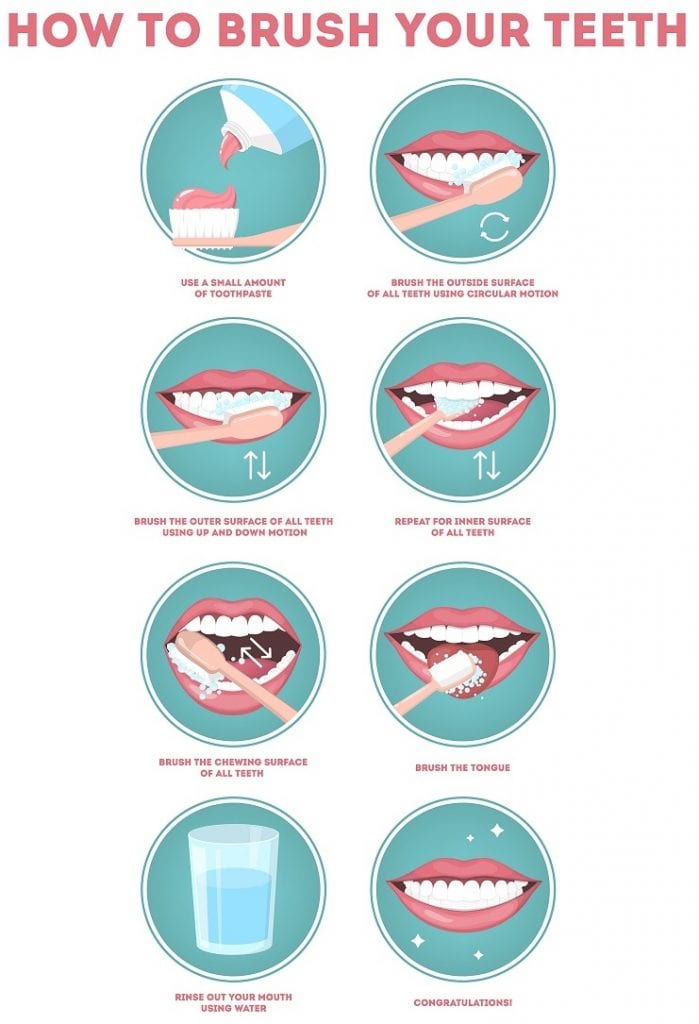Practising good oral hygiene at home together with routine visits to the dentist helps you maintain healthy teeth and gums. With the ongoing global health events, never before has it been more important to take good care of your own dental health at home to ensure healthy teeth and gums. So, what is the best way to look after your teeth at home? Below are the best dental care and oral hygiene tips today for your home dental care routine.
Best dental care tips to look after your teeth at home
1. Brush your teeth thoroughly.
- At least twice a day remember to brush your teeth, especially before going to bed. Brushing well can clear your teeth of food particles and bacteria, but if you then snack before going to sleep (without brushing) this can allow food particles and sugar to remain on your teeth providing fuel for bacteria to grow.
- Use a toothbrush with soft bristles, so it’s gentle on your gums. A toothbrush with a small head can help more easily reach your back teeth. Also, look for a toothbrush with bristles that are small enough to reach into the crevices of your molars, where food scraps can hide.
- Use of fluoride toothpaste has been shown to protect your teeth by hardening the tooth enamel, reducing your risk of tooth decay. However, it is not recommended for children who are unable to rinse their mouth thoroughly after its use. Select the appropriate level of fluoride in your toothpaste based on the age group and the associated tooth decay risk. Should you prefer not to use fluoride toothpaste, please choose a diet that is free from or includes minimal amounts processed foods and refined sugars, in order to reduce the risk of dental decay.
- Brush your teeth for at least 2 minutes. Use a timer, sing a song in your head or even cue up a two-minute YouTube video to help you ensure that you’re brushing your teeth sufficiently. Make sure to brush every tooth and molar.
- Use gentle brushing strokes. It doesn’t take a lot of force to remove trapped food particles stuck in your teeth and bacterial plaque. Brushing too hard or using a hard-bristled toothbrush can damage tooth enamel, as well as your gums causing gum recession.
- Remember to replace your toothbrush or toothbrush head for electric toothbrushes every 3 months.
- Follow the easy guide below for best tooth brushing technique.

2. Clean your tongue.
Plaque can also build up on your tongue. Bacterial plaque on your tongue contributes to bad breath and can create oral health problems. So, clean your tongue every time you brush your teeth. You can use special plastic tongue scrapers or brushing with a toothbrush can be just as effective. Some toothbrushes come with a ridged tongue scraper on the back of the brush.
3. Floss your teeth daily.
Dental flossing removes food particles stuck between your teeth and plaque that has built up between your teeth. Flossing is the best way to get plaque off your teeth at home. It’s also a really good way to stimulate the gums and help lower inflammation in the area. Food debris allowed to stay on your teeth feeds bacteria which multiplies throughout the night.
- Floss each night before bed (and then don’t snack). If you are prone to gum disease or dental plaque build-up, we recommend that you floss twice a day.
- Use a piece of floss up to 45cm in length, so you have a fresh area of floss every few teeth. This way you are not reinserting bacteria you just removed.
- Gently floss all the way down to the gumline before hugging the side of the tooth with up-and-down motions.
- Use a gentle backwards and forwards ‘C’ shape sawing motion, wrapping the dental floss around each tooth to help you remove plaque.
- Make sure you floss between each tooth.
4. Reduce the amount of acidic fizzy drinks and sugary foods you consume.
- Acidic drinks like soft drinks, cordials and fruit juices dissolve the mineral in tooth enamel and soften tooth material. These acids cause holes called cavities or caries in your teeth.
- Sugar in foods such as candy, desserts and many processed foods are a great source of food for acid-producing bacteria in our mouths. These acids in turn cause dental cavities.
- Starchy foods, such as crackers, bread, chips and pasta can also cause tooth decay. These foods break down into simple sugars in the mouth, feeding the acid-producing bacteria in dental plaque. These acids again cause tooth decay.
- In severe cases, teeth may be dissolved right down to the gum.
- Don’t brush or floss immediately after drinking acidic beverages like fizzy soft drinks, sports drinks and juices. Saliva, rich in minerals, has a natural neutralising and buffering ability that re-mineralises enamel surfaces ‘softened’ by acid in 30-60 minutes. So, it’s best to wait at least one hour to allow for your saliva to neutralise the acidic attack before brushing or flossing your teeth.
5. Make the use of mouthwash part of your dental care routine for oral hygiene.
Mouthwash helps to reduce the amount of acid in the mouth, cleans hard-to-brush areas in and around the gums and re-mineralises the teeth. Mouthwash is not necessary for most people as long as they brush their teeth thoroughly. However, mouthwash is particularly helpful for individuals whereby thorough brushing and flossing is more difficult. Its short-term use is also beneficial in acute cases of gum disease. An alcohol-free mouthwash would be preferable if it is to be used daily.
